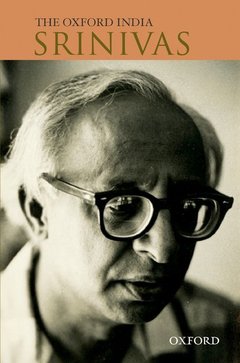The oxford india srinivas (harback)
Langue : Anglais
Auteurs : Srinivas , Guha Ramachandra, Shah

Bringing together M.N. Srinivas's best writings on subjects ranging from village studies, caste and the social structure, gender, religion, and cultural and social change in India, The Oxford India Srinivas re-introduces a new generation of readers to the one of the pioneers of sociology and social anthropology in India. This compilation of essays examines many diverse aspects of Indian society and culture, both traditional as well as contemporary. Part I, on village studies, contains essays on Srinivas's studies in the village of Rampura, looking at various aspects of life in an Indian village, including the domination of caste in social life and village hierarchy. Part II focuses on caste and social structure in India, discussing caste in India, not just its evolution over time but also its place in modern times. Parts III and IV contain essays on gender and religion, while Part V examines the phenomena of cultural and social change in India, including a discussion on nation-building, science, technology and development as well as changing values and institutions in modern India. Parts VI and VII examine the development and scope of sociology and social anthropology in India, including a discussion on the importance of method in these disciplines. Part VIII is a unique section which includes essays of an autobiographical nature. The new Introduction by Ramachandra Guha assesses Srinivas's contributions to both Indian academic as well as his position as one of the heavyweights of the disciplines he was associated with. The Foreword by A.M. Shah highlights the importance of Srinivas's work for both academia and in understanding the dynamics of social reality in India. This edition will be of interest to students and scholars of sociology and social anthropology, as well as the informed general reader interested in Indian society.
Publisher's Note, Introduction (Ramachandra Guha), List of Major Works, Foreword (A.M. Shah), Preface (Lakshmi Srinivas), Acknowledgements. PART I: VILLAGE STUDIES: RAMPURA. 1.The Indian Village: Myth and Reality. 2.The Social System of a Mysore Village. 3.The Dominant Caste in Rampura, 4.The Study of Disputes in an Indian Village. 5.A Caste Dispute among the Washermen of Mysore. 6.A Joint Family Dispute in a Mysore Village. 7.The Case of the Potter and the Priest. PART II: CASTE AND SOCIAL STRUCTURE . 8.The Evolution of Caste in India. 9.Varna and Caste. 10.Some Reflections on the Nature of Caste Hierarchy. 11.Mobility in the Caste System. 12.A Note on Sanskritization and Westernization. 13.The Cohesive Role of Sanskritization. 14.The Caste System and its Future. 15.Caste in Modern India. PART III: GENDER. 16.The Changing Position of Indian Women. 17.Some reflections on Dowry. 18.Culture and Human Fertility in India. PART IV: RELIGION. 19.A Brief Note on Ayyappa, the South Indian Diety. 20.Gandhi's Religion. 21.The Social Significance of Religion in India. PART V: CULTURAL AND SOCIAL CHANGE IN INDIA . 22.On Living in a Revolution. 23.Nation Building in Independent India. 24.Science, Technology and Rural Development in India. 25.The Dual Cultures of Independent India. 26.Changing Institutions and Values in Modern India. PART VI: SOCIOLOGY AND SOCIAL ANTHROPOLOGY IN INDIA . 27.Social Anthropology and Sociology. 28.Sociology in India and its Future. 29.The Development of Sociology and Social Anthropology in India. PART VII: METHOD. 30.Village Studies, Participant Observation and Social Science Research in India. 31.The Fieldworker and the Field: A Village in Karnataka. 32.The Observer and the Observed in the Study of Cultures. 33.The Insider versus The Outsider in the Study of Cultures. 34.Participant Observation. 35.Studying One's Own Culture: Some Thoughts. 36.Indian Anthropologists and the Study of Indian Culture. 37.Social Anthropology and Literary Sensibility. PART VIII: AUTOBIOGRAPHICAL ESSAYS. 38.My Baroda Days. 39.Sociology in Delhi. 40.Itineraries of an Indian Social Anthropologist. 41.Practising Social Anthropology in India. 42.All is Not Lost if Your Plans Go Awry. Afterword: An Interview with M.N. Srinivas (Christopher J. Fuller). References. Index.
M.N. Srinivas (1916-99) was former J.R.D. Tata Visiting Fellow, National Institute of Advanced Studies, Bangalore. Ramachandra Guha is a well-known historian and writer. A.M. Shah was Former Professor of Sociology, Delhi School of Economics, University of Delhi.
Bringing together M.N. Srinivas's best writings on subjects ranging from village studies, caste and the social structure, gender, religion, and cultural and social change in India, The Oxford India Srinivas re-introduces a new generation of readers to the one of the pioneers of sociology and social anthropology in India. An Introduction by Ramachandra Guha situates Srinivas's contributions to Indian sociology in the current context.
Date de parution : 06-2009
Ouvrage de 760 p.
15x22.5 cm
Épuisé
© 2024 LAVOISIER S.A.S.



